22 April 2022 – Year 3
This week, we have been learning about the alternative graphemes that make the /sh/ sound. Here is a list of the words we have covered:
mission
pressure
fraction
mention
position
delicious
optician
special
parachute
brochure
The children will be tested on these words on Friday 29th April 2022.
Welcome back!
It was so lovely to see all the smiling faces when we returned to school on Tuesday. We started off the week by having lots of chats about what the children had been doing over the Easter break and we are glad to hear that everyone had a good holiday.
Our new theme for the next half-term is ‘Minibeasts’ and we’ve already been busy learning about spiders. The children have enjoyed listening to ‘Spider Sandwiches’ by Claire Freedman and we’ve been discussing the ingredients we may need to make some of the delicious recipes in the book. How about a nice bowl of ‘lice rice’, anyone? The children have been writing recipes to go into our cookbook and they have been taking orders in our rainforest cafe. We’ve been looking at the minibeasts on our investigation table and drawing spiders at the creative table. We’ve also been counting spiders and thinking about the amount of legs they have, too.
The weather has been beautiful so we’ve been outside a lot this week. On Wednesday, the children enjoyed washing our outside vehicles and we’ve also been exercising our gross motor skills by playing games with hoops. Inside, we’ve been doing lots of mark-making and looking at letter formation. A very busy week indeed!
Next week, we’ll be learning about our new focus number (the number 5) and we’ll also be planting out the herbs which we began growing on the window ledge of our classroom. Our beans are already doing really well outside and will shortly need sticks for support! I wonder whose beanstalk will be the tallest?
Things to remember:
As the weather is getting warmer, please bring a hat into school for your child.
Please remember to name your child’s clothes, shoes and water bottles.
Many thanks.
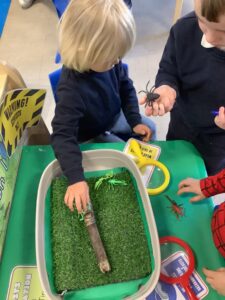
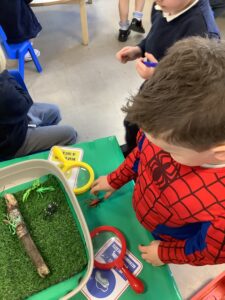
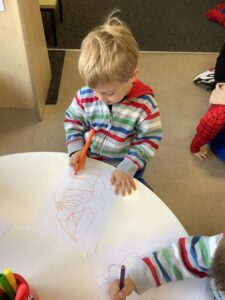
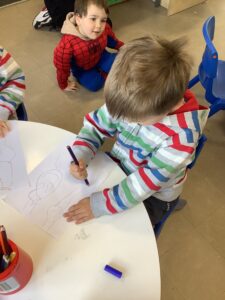

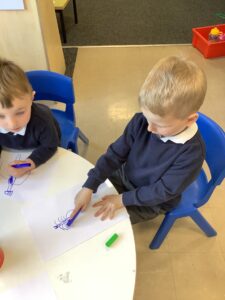
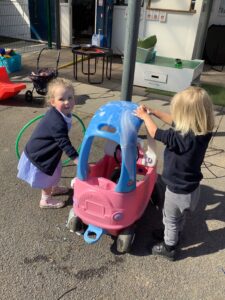
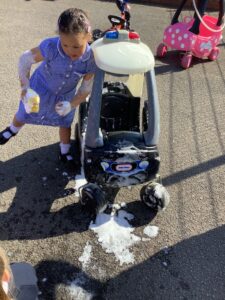

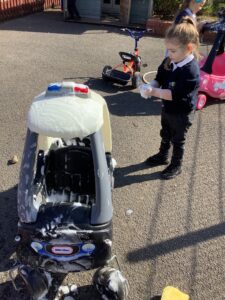
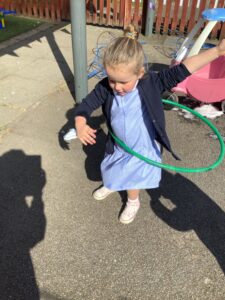
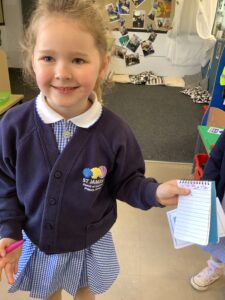
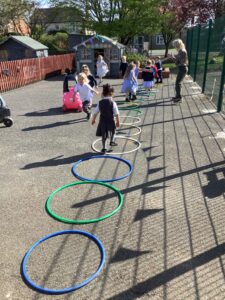
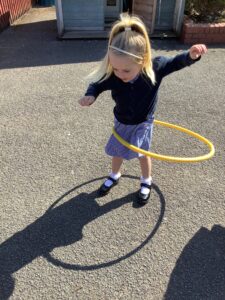
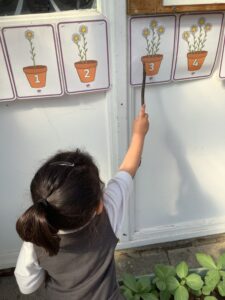

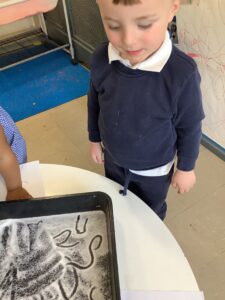

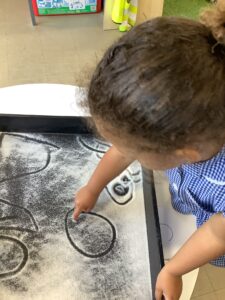
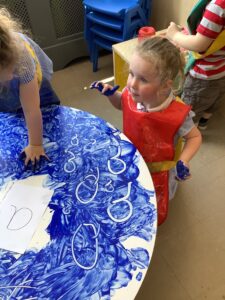
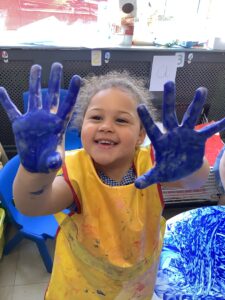
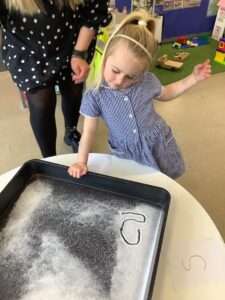
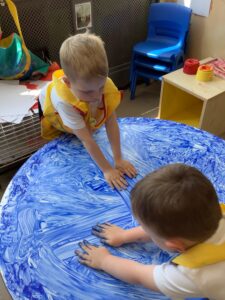
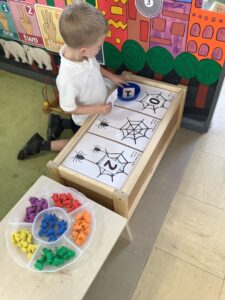
Science: How does your garden grow?
It has been great to see all the children returning to school after the Easter break. They are settled, calm and ready to continue with their learning.
This term is set to be another busy one so keep checking the website to see what we have been up to.
Science
In our science lessons, we are going to be biologists. 
The focus of our lessons will be plants. Yesterday, we began by identifying investigating and describing the different parts of flowering plants.
The vocabulary, related with this learning, is listed below. Ask your child if they know any of these words.
| stem | holds the plant upright and supports the leaves; contains tubes that allow water to travel from the roots to the rest of the plant
|
|
| roots | helps anchor the plant into the soil; takes up water and nutrients from the soil
|
|
| leaves | catch sunlight and use this to make food |
| photosynthesis | how plants turn sunlight into food |
| pollen | a dust-like powder that causes plants to make new seeds
|
| pollination | transferring pollen from the male parts of a flower to the female part of a flower so new plants can be made |
| stamen | the male part of the flower which produces pollen |
| stigma | the female part of a flower that pollen attaches to during pollination |
| seed dispersal | the way seeds get from the parent plant to a new place so that they can grow into new plants |
Examining, describing and identifying different parts of a flowering plant.
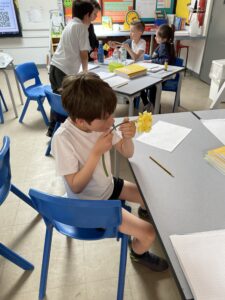
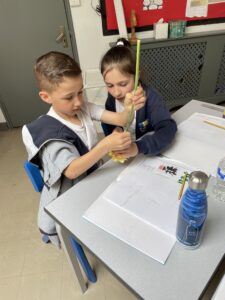
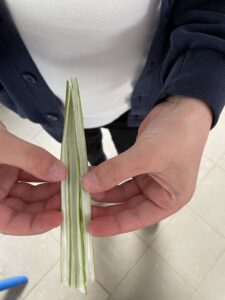
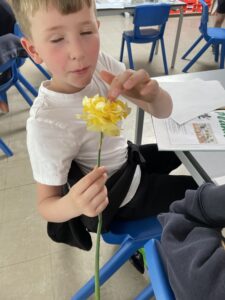
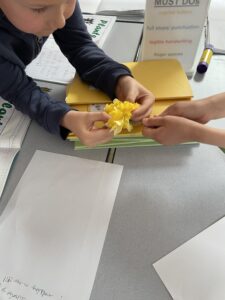
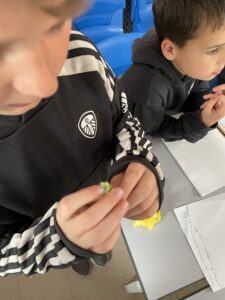
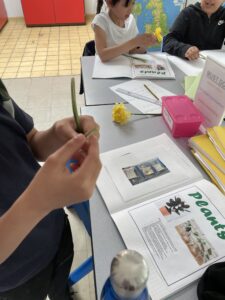
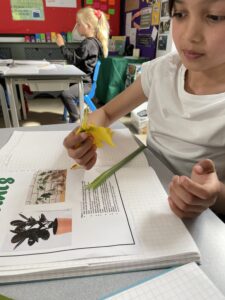
In order to learn more about the different growth stages of plants, we have placed some beans in a glass jar. Then, we added cotton wool and some water.
Now, we observe, add water daily and make notes. This experiment will take place over the next two weeks so stay posted to see how our beans grow.
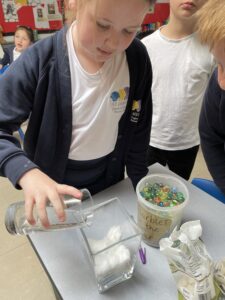
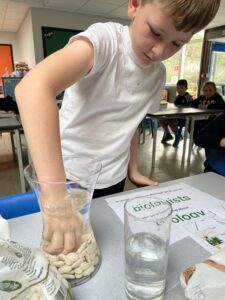
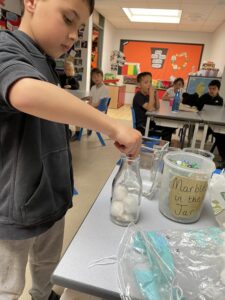
PTA bake sale
Just before the Easter break, the PTA organised a bake sale. With your support, we raised £214.20 which will go towards raising funds for school. Thank you to all involved.
Look out for some more exciting events happening this term!
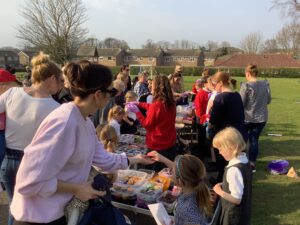
Our Christian value this half-term is…
…peace.
Peace is about positive harmony and healthy relationships between people. It involves spiritual as well as material security. Peace is a state of true wholeness, a state of wellbeing. This value promotes harmony, stability and security within the school and local community.
Why was this Christian value chosen?
‘When Jesus was sent down there was peace’
Home challenge:
The dove carrying an olive branch is a symbol of peace in Christianity. Research why this is a symbol of peace. Is Christianity the only religion to have a symbol of peace?
‘Peace I leave with you; my peace I give you.’
(John 14:27)
This week’s bible story
11 I have told you these things so that you can have the true happiness that I have. I want you to be completely happy. 12 This is what I command you: Love each other as I have loved you. John 15: 11-12
Have a think about an occasion when you have argued with someone and found it difficult to resolve.
Do you know of any conflicts or wars taking place anywhere in the world? Unfortunately, conflicts are continuously occurring as humans try to share the world.
Whether an argument occurs between two people or between nations, the situation is still a conflict. Having conflicts is part of being human. If we did not have differences of opinion, we would never see anything in a new light or change a view that we have wrongly held. However, what is extremely important is the way in which a conflict is handled. If conflicts between large groups of people get out of hand, they can become bigger and bigger until they become wars. The way in which we manage conflict can enable people who have different opinions to work peacefully together for the better.
When we think of peace we often think of:
– freedom from war
– freedom from disputes
– freedom from worry and anxiety
– peace of mind
– quietness, silence, stillness
In the Bible, in Matthew 5.6-8, it says that people who work for peace are happy. In John 15.11-12, Jesus says that we will be happy if we care for others.
Most world religions value the importance of peace.
Reflection:
How could you contribute to peace around the world? Maybe you could try harder to listen when someone has a different opinion to your own. Maybe you could walk away if you feel angry with someone. There are many little things that we can do to contribute to the peace of the world.
Prayer
Dear God,
Thank you for giving us the ability to make others feel better.
Help us to share our lives together in peace.
Help us to love and care for those who need us.
Help us to care for our families and friends.
Please help us to play our parts in encouraging peace in the world.
Amen
Week beginning 18 April 2022
It’s the summer term. Sorry that you can’t be in school this week. Here are a range of resources linked to what is happening in class. Don’t forget to get in touch with your class teacher if you need support.
Maths
Follow this sequence of maths learning which is linked to ratio, proportion and negative numbers.
Lesson 1: video, worksheet, answers
Lesson 2: video, worksheet, answers
Lesson 3: video, worksheet, answers
Lesson 4: video, worksheet, answers
Lesson 5: video, worksheet, answers
Lesson 6: video, worksheet, answers
Lesson 7: video, worksheet, answers
Lesson 8: video, worksheet, answers
Lesson 9: video, worksheet, answers
You don’t have to print the worksheet. Your child can write or draw their answers on paper. Your child’s learning will be most effective if you sit with them to pause the clip and check / praise / support your child as the clip moves on.
Practise times tables on Times Table Rockstars, too. Email the class teacher if you need your child’s login and password details.
(Suggested time: 30 minutes of Maths and 15 minutes of Rockstars daily)
Spelling
Look on the homework page to find this week’s spellings. They should choose some past spellings that they feel less confident with. Your child should complete one task each day.
- Day 1: Generate more words linked to the spelling pattern or ‘rule’. You could look out for the words in the book you’re reading at home, or any other text, like a website linked to our science topic of Living Things and their Habitat.
- Day 2: Practise the spellings using two of the ideas in our Super Spelling Strategies guide. (Set yourself and others at home a challenge of using some of the words when you’re speaking, too!)
- Day 3: Write separate sentences, each containing one of the spellings. (Don’t forget to show off really neat handwriting and make sure you sentence starts with a capital letter and ends with a full stop, exclamation mark (!) or question mark (?).
- Day 4: Repeat Task 2 or 3.
- Day 5: Get an adult at home to test you on your spellings. Practise any you spell incorrectly – you could write them out carefully until you’re sure.
(Suggested time: 15-20 minutes daily)
Reading fluency.
This is the text that we will be using in school. In school, we generally follow this sequence:
- Day 1: Read the text aloud with your child listening. Read it clearly and slowly, pointing to each word as you read. Have a chat about any unfamiliar words.
- Day 2: Read aloud each sentence (a full short sentence or part of a longer sentence), and have your child read it back to you. Do this ‘echo reading’ for the whole text.
- Day 3: Read the text and talk about the effect of the punctuation on how you read it – pauses for full stops and expression for exclamations (!) or questions (?). Your child reads the text aloud.
- Day 4: Read together with expression (just like you practised on Day 3).
- Day 5: Your child reads independently and fluently.
(Suggested time: 15 minutes daily)
Reading comprehension
We’ll be using this RIC text in class to practise comprehension skills. RIC stands for:
- Retrieve: finding information in a text
- Interpret: using clues in the text to unlock information
- Choice: thinking about the author’s choice of words, techniques or organisation that make the text interesting and enjoyable to read
At school, we like to promote a passion for reading. This website has a range of extracts and interviews with different authors. Choose one author each day and read an extract from their book. If you like it, carry out your own research on the author and book.
(Suggested time: 30 minutes daily)
Writing
In writing, we will be reviewing how punctuation is used correctly in our writing. Follow this sequence of lessons on punctuation. There’s a whole series of lessons, but start at Lesson 1 and work through, doing one (or maybe even two) each day. (If you’re self-isolating in your second week, stick with the series of lessons you’ve already started and aim to complete the full series.) Finished? Try this mixed grammar practice.
(Suggested time: 30-40 minutes for each)
Topic
Our topic this half-term is Explorers. In school, we’ll be comparing an area of South America with that of the UK.
Follow these lessons on Building Locational Knowledge: South America from Oak Academy. Follow the lesson sequence. It has 4 lessons so you could do two a week. We’ll also be looking at different biomes.
(Suggested time: 30-40 minutes)
Science
This term is all about electricity.
These six lessons from Oak Academy link closely to what we’ll be doing in class this half term. Start at Lesson 1 and work through, doing two or three in the week.
If Science really motivates your child, you could also use look at these lessons all about practical Science.
(Suggested time: 30-45 minutes)
PE
Don’t forget to do some daily exercise!
Do two or three of these Five Minute Moves from Joe Wicks each day – spread them across the day as if they were playtimes, maybe!
Try working through this series of 25 lessons from the Association for Physical Education – do two or three in the week.
(Suggested time: 5 minutes daily, plus 30 minutes for the longer PE lessons)
Extra stuff…
As an extra (or as an alternative, if this helps to motivate your child)…
Geography is our topic-driver this half-term so you could brush up on your locational knowledge. You could explore some online maps and try to memorise some new countries, capitals, rivers and mountain ranges. These three lessons about Europe are worth checking out.
What about some Living and Learning? While you’re away from school, you could check out these lessons on money!
Week beginning 18 April 2022
It’s the summer term. Sorry that you can’t be in school this week. Here are a range of resources linked to what is happening in class. Don’t forget to get in touch with your class teacher if you need support.
Maths
Follow this sequence of maths learning which is linked to fractions.
Lesson 1: video, worksheet, answers
Lesson 2: video, worksheet, answers
Lesson 3: video, worksheet, answers
Lesson 4: video, worksheet, answers
Lesson 5: video, worksheet, answers
Lesson 6: video, worksheet, answers
Lesson 7: video, worksheet, answers
Lesson 8: video, worksheet, answers
Lesson 9: video, worksheet, answers
Lesson 10: video, worksheet, answers
You don’t have to print the worksheet. Your child can write or draw their answers on paper. Your child’s learning will be most effective if you sit with them to pause the clip and check / praise / support your child as the clip moves on.
Practise times tables on Times Table Rockstars, too. Email the class teacher if you need your child’s login and password details.
(Suggested time: 30 minutes of Maths and 15 minutes of Rockstars daily)
Spelling
Look on the homework page to find this week’s spellings. They should choose some past spellings that they feel less confident with. Your child should complete one task each day.
- Day 1: Generate more words linked to the spelling pattern or ‘rule’. You could look out for the words in the book you’re reading at home, or any other text, like a website linked to our science topic of Living Things and their Habitat.
- Day 2: Practise the spellings using two of the ideas in our Super Spelling Strategies guide. (Set yourself and others at home a challenge of using some of the words when you’re speaking, too!)
- Day 3: Write separate sentences, each containing one of the spellings. (Don’t forget to show off really neat handwriting and make sure you sentence starts with a capital letter and ends with a full stop, exclamation mark (!) or question mark (?).
- Day 4: Repeat Task 2 or 3.
- Day 5: Get an adult at home to test you on your spellings. Practise any you spell incorrectly – you could write them out carefully until you’re sure.
(Suggested time: 15-20 minutes daily)
Reading fluency.
This is the text that we will be using in school. In school, we generally follow this sequence:
- Day 1: Read the text aloud with your child listening. Read it clearly and slowly, pointing to each word as you read. Have a chat about any unfamiliar words.
- Day 2: Read aloud each sentence (a full short sentence or part of a longer sentence), and have your child read it back to you. Do this ‘echo reading’ for the whole text.
- Day 3: Read the text and talk about the effect of the punctuation on how you read it – pauses for full stops and expression for exclamations (!) or questions (?). Your child reads the text aloud.
- Day 4: Read together with expression (just like you practised on Day 3).
- Day 5: Your child reads independently and fluently.
(Suggested time: 15 minutes daily)
Reading comprehension
We’ll be using this RIC text in class to practise comprehension skills. RIC stands for:
- Retrieve: finding information in a text
- Interpret: using clues in the text to unlock information
- Choice: thinking about the author’s choice of words, techniques or organisation that make the text interesting and enjoyable to read
At school, we like to promote a passion for reading. This website has a range of extracts and interviews with different authors. Choose one author each day and read an extract from their book. If you like it, carry out your own research on the author and book.
(Suggested time: 30 minutes daily)
Writing
In writing, we will be reviewing how punctuation is used correctly in our writing. Follow this sequence of lessons on punctuation. There’s a whole series of lessons, but start at Lesson 1 and work through, doing one (or maybe even two) each day. (If you’re self-isolating in your second week, stick with the series of lessons you’ve already started and aim to complete the full series.) Finished? Try this mixed grammar practice.
(Suggested time: 30-40 minutes for each)
Topic
Our topic this half-term is Explorers. In school, we’ll be comparing an area of South America with that of the UK.
Follow these lessons on Building Locational Knowledge: South America from Oak Academy. Follow the lesson sequence. It has 4 lessons so you could do two a week. We’ll also be looking at different biomes.
(Suggested time: 30-40 minutes)
Science
This term is all about electricity.
These six lessons from Oak Academy link closely to what we’ll be doing in class this half term. Start at Lesson 1 and work through, doing two or three in the week.
If Science really motivates your child, you could also use look at these lessons all about practical Science.
(Suggested time: 30-45 minutes)
PE
Don’t forget to do some daily exercise!
Do two or three of these Five Minute Moves from Joe Wicks each day – spread them across the day as if they were playtimes, maybe!
Try working through this series of 25 lessons from the Association for Physical Education – do two or three in the week.
(Suggested time: 5 minutes daily, plus 30 minutes for the longer PE lessons)
Extra stuff…
As an extra (or as an alternative, if this helps to motivate your child)…
Geography is our topic-driver this half-term so you could brush up on your locational knowledge. You could explore some online maps and try to memorise some new countries, capitals, rivers and mountain ranges. These three lessons about Europe are worth checking out.
What about some Living and Learning? While you’re away from school, you could check out these lessons on money!
Week beginning 18 April 2022
Hi everyone
We hope you’re feeling happy and healthy at home. We miss having you in school but we want you to know that you’re still very much part of our school community. Enjoy your home learning for this week.
Maths
Follow this sequence of maths learning which is linked to decimals.
- Lesson 1: video
- Lesson 2: video, worksheet, answers
- Lesson 3: video, worksheet, answers
- Lesson 4: video, worksheet, answers
- Lesson 5: video, worksheet, answers
- Lesson 6: video, worksheet, answers
- Lesson 7: video, worksheet, answers
- Lesson 8: video, worksheet, answers
- Lesson 9: video, worksheet, answers
- Lesson 10: video, worksheet, answers
You don’t have to print the worksheet. Your child can write or draw their answers on paper. Your child’s learning will be most effective if you sit with them to pause the clip and check / praise / support your child as the clip moves on.
Practise times tables on Times Table Rockstars, too. If your child is in Y3, we’re concentrating on the 8 times table. If your child is in Y4, we’re concentrating on all times tables up to and including 12 x 12. Email the class teacher if you need your child’s login and password details.
(Suggested time: 30 minutes of Maths and 15 minutes of Rockstars daily)
Spelling
Look on the homework page to find this week’s spellings. They should choose some past spellings that they feel less confident with. Your child should complete one task each day.
- Day 1: Generate more words linked to the spelling pattern or ‘rule’. You could look out for the words in the book you’re reading at home, or any other text, like a website linked to our science topic of Living Things and their Habitat.
- Day 2: Practise the spellings using two of the ideas in our Super Spelling Strategies guide. (Set yourself and others at home a challenge of using some of the words when you’re speaking, too!)
- Day 3: Write separate sentences, each containing one of the spellings. (Don’t forget to show off really neat handwriting and make sure you sentence starts with a capital letter and ends with a full stop, exclamation mark (!) or question mark (?).
- Day 4: Repeat Task 2 or 3.
- Day 5: Get an adult at home to test you on your spellings. Practise any you spell incorrectly – you could write them out carefully until you’re sure.
(Suggested time: 15-20 minutes daily)
Reading fluency
This is the text we’re using in class this week to build up fluency skills.
In school, we generally follow this sequence:
- Day 1: Read the text aloud with your child listening. Read it clearly and slowly, pointing to each word as you read. Have a chat about any unfamiliar words.
- Day 2: Read aloud each sentence (a full short sentence or part of a longer sentence), and have your child read it back to you. Do this ‘echo reading’ for the whole text.
- Day 3: Read the text and talk about the effect of the punctuation on how you read it – pauses for full stops and expression for exclamations (!) or questions (?). Your child reads the text aloud.
- Day 4: Read together with expression (just like you practised on Day 3).
- Day 5: Your child reads independently and fluently.
(Suggested time: 15 minutes daily)
Reading comprehension
We’ll be using this RIC text in class to practise comprehension skills. RIC stands for:
- Retrieve: finding information in a text
- Interpret: using clues in the text to unlock information
- Choice: thinking about the author’s choice of words, techniques or organisation that make the text interesting and enjoyable to read
Follow these lessons from Oak National Academy. There’s a whole series of lessons, but start at Lesson 1 and work through, doing one (or maybe even two) each day. (If you’re self-isolating in your second week, stick with the series of lessons you’ve already started and aim to complete the full series.)
(Suggested time: 30 minutes daily)
Writing
Follow these lessons from Oak National Academy. There’s a whole series of lessons, but start at Lesson 1 and work through, doing one (or maybe even two) each day. (If you’re self-isolating in your second week, stick with the series of lessons you’ve already started and aim to complete the full series.)
(Suggested time: 30-40 minutes for each)
Topic
Our topic this half-term is about geography.
Follow these lesson from Oak National Academy: Europe, UK, and hemispheres. There’s a whole series of lessons, but start at Lesson 1 and work through, doing one (or maybe even two) each day. (If you’re self-isolating in your second week, stick with the series of lessons you’ve already started and aim to complete the full series.)
(Suggested time: 30-40 minutes)
Science
Our focus this half-term is about plants.
These six lessons from Oak National Academy link closely to what we’ve been doing in class. Start at Lesson 1 and work through, doing two or three in the week. If you’ve previously completed on of these lessons, have a go at the ones you haven’t completed yet.
If Science really motivates your child, you could also use look at these lessons all about practical Science.
(Suggested time: 30-45 minutes)
PE
Don’t forget to do some daily exercise!
Do two or three of these Five Minute Moves from Joe Wicks each day – spread them across the day as if they were playtimes, maybe!
Try working through this series of 25 lessons from the Association for Physical Education – do two or three in the week.
(Suggested time: 5 minutes daily, plus 30 minutes for the longer PE lessons)
Extra stuff…
As an extra (or as an alternative, if this helps to motivate your child)…
Fancy learning about a new religion? You don’t have to be religious to learn about, and appreciate, religions from all around the world. Check out this set of lessons from Oak National Academy – you could choose to focus on one religion or dip into each set for an overview.
What about some music? Choose one of these units and work through it on Oak National Academy.
Week beginning 18 April 2022
Hi everyone
We hope you’re feeling happy and healthy at home. We miss having you in school but we want you to know that you’re still very much part of our school community. Enjoy your home learning for this week.
Maths
Follow this sequence of maths learning which is linked to time.
- Lesson 1: video, worksheet, answers
- Lesson 2: video, worksheet, answers
- Lesson 3: video, worksheet, answers
- Lesson 4: video, worksheet, answers
- Lesson 5: video, worksheet, answers
- Lesson 6: video, worksheet, answers
- Lesson 7: video, worksheet, answers
- Lesson 8: video
- Lesson 9: video, worksheet, answers
- Lesson 10: video, worksheet, answers
You don’t have to print the worksheet. Your child can write or draw their answers on paper. Your child’s learning will be most effective if you sit with them to pause the clip and check / praise / support your child as the clip moves on.
Practise times tables on Times Table Rockstars, too. If your child is in Y3, we’re concentrating on the 8 times table. If your child is in Y4, we’re concentrating on all times tables up to and including 12 x 12. Email the class teacher if you need your child’s login and password details.
(Suggested time: 30 minutes of Maths and 15 minutes of Rockstars daily)
Spelling
Look on the homework page to find this week’s spellings. They should choose some past spellings that they feel less confident with. Your child should complete one task each day.
- Day 1: Generate more words linked to the spelling pattern or ‘rule’. You could look out for the words in the book you’re reading at home, or any other text, like a website linked to our science topic of Living Things and their Habitat.
- Day 2: Practise the spellings using two of the ideas in our Super Spelling Strategies guide. (Set yourself and others at home a challenge of using some of the words when you’re speaking, too!)
- Day 3: Write separate sentences, each containing one of the spellings. (Don’t forget to show off really neat handwriting and make sure you sentence starts with a capital letter and ends with a full stop, exclamation mark (!) or question mark (?).
- Day 4: Repeat Task 2 or 3.
- Day 5: Get an adult at home to test you on your spellings. Practise any you spell incorrectly – you could write them out carefully until you’re sure.
(Suggested time: 15-20 minutes daily)
Reading fluency
This is the text we’re using in class this week to build up fluency skills.
In school, we generally follow this sequence:
- Day 1: Read the text aloud with your child listening. Read it clearly and slowly, pointing to each word as you read. Have a chat about any unfamiliar words.
- Day 2: Read aloud each sentence (a full short sentence or part of a longer sentence), and have your child read it back to you. Do this ‘echo reading’ for the whole text.
- Day 3: Read the text and talk about the effect of the punctuation on how you read it – pauses for full stops and expression for exclamations (!) or questions (?). Your child reads the text aloud.
- Day 4: Read together with expression (just like you practised on Day 3).
- Day 5: Your child reads independently and fluently.
(Suggested time: 15 minutes daily)
Reading comprehension
We’ll be using this RIC text in class to practise comprehension skills. RIC stands for:
- Retrieve: finding information in a text
- Interpret: using clues in the text to unlock information
- Choice: thinking about the author’s choice of words, techniques or organisation that make the text interesting and enjoyable to read
Follow these lessons from Oak National Academy. There’s a whole series of lessons, but start at Lesson 1 and work through, doing one (or maybe even two) each day. (If you’re self-isolating in your second week, stick with the series of lessons you’ve already started and aim to complete the full series.)
(Suggested time: 30 minutes daily)
Writing
Follow these lessons from Oak National Academy. There’s a whole series of lessons, but start at Lesson 1 and work through, doing one (or maybe even two) each day. (If you’re self-isolating in your second week, stick with the series of lessons you’ve already started and aim to complete the full series.)
(Suggested time: 30-40 minutes for each)
Topic
Our topic this half-term is about geography.
Follow these lesson from Oak National Academy: Europe, UK, and hemispheres. There’s a whole series of lessons, but start at Lesson 1 and work through, doing one (or maybe even two) each day. (If you’re self-isolating in your second week, stick with the series of lessons you’ve already started and aim to complete the full series.)
(Suggested time: 30-40 minutes)
Science
Our focus this half-term is about plants.
These six lessons from Oak National Academy link closely to what we’ve been doing in class. Start at Lesson 1 and work through, doing two or three in the week. If you’ve previously completed on of these lessons, have a go at the ones you haven’t completed yet.
If Science really motivates your child, you could also use look at these lessons all about practical Science.
(Suggested time: 30-45 minutes)
PE
Don’t forget to do some daily exercise!
Do two or three of these Five Minute Moves from Joe Wicks each day – spread them across the day as if they were playtimes, maybe!
Try working through this series of 25 lessons from the Association for Physical Education – do two or three in the week.
(Suggested time: 5 minutes daily, plus 30 minutes for the longer PE lessons)
Extra stuff…
As an extra (or as an alternative, if this helps to motivate your child)…
Fancy learning about a new religion? You don’t have to be religious to learn about, and appreciate, religions from all around the world. Check out this set of lessons from Oak National Academy – you could choose to focus on one religion or dip into each set for an overview.
What about some music? Choose one of these units and work through it on Oak National Academy.